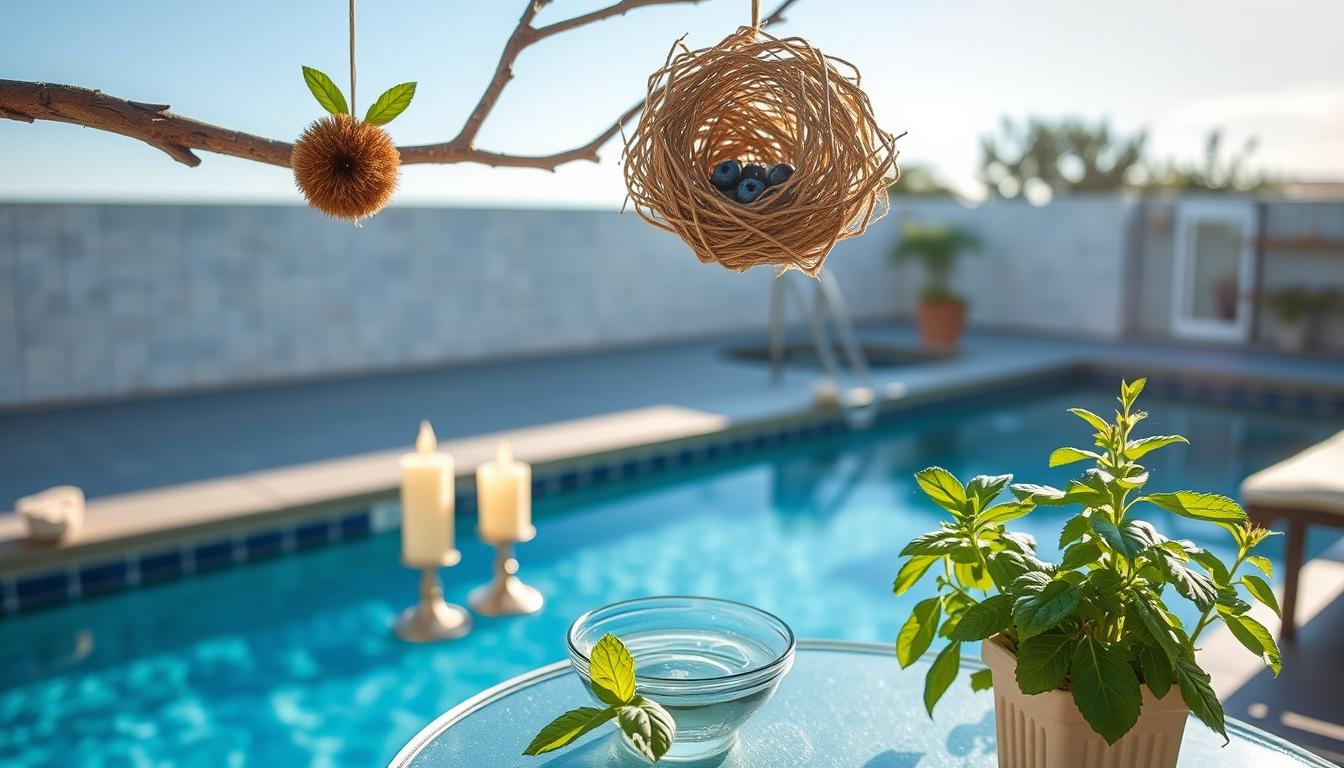
Imagine a perfect summer day ruined by wasps buzzing around your pool. These pests can make swimming dangerous and stressful. Understanding why wasps like pools is key to keeping them away.
Pool safety depends on effective wasp deterrents. Let’s explore why these insects invade our swimming areas. We’ll also discover ways to keep them at bay.
Wasps visit pools for water and are drawn to chlorine’s smell. Sugary drinks and food nearby can also attract them. Good pool maintenance and wasp repellents are essential.
Natural remedies, traps, and sprays can reduce wasp infestations. These methods help create a safer, more enjoyable swimming experience for everyone.
We’ll examine why wasps like pools and share effective ways to repel them. You’ll learn about natural deterrents like essential oils and wasp-repelling plants.
We’ll also cover proactive steps such as alternative water sources and pool covers. These tips will help you create a wasp-free swimming environment.
Get ready to take control of your pool area. Learn how to stop wasp nests from spoiling your summer fun!
Understanding Wasps’ Attraction to Pools
Pool owners need to know why wasps are drawn to swimming pools. Understanding wasp behavior and pool attractants helps create better strategies. This knowledge can reduce wasp presence and improve outdoor enjoyment.
Wasps Seek Water Sources
Wasps need water to survive, especially in hot summers. Pools become inviting oases when natural water sources are scarce. Wasps also collect water for their nests to support their broods.
Wasps Are Drawn to Chlorine Smell
The scent of chlorine in pool water appeals to wasps. This distinct aroma can attract wasps from surrounding areas. The chlorine smell contributes to increased wasp presence around swimming pools.
Did you know? Wasps are more attracted to murky pool waters compared to clear, well-maintained pools.
Wasps Are Attracted to Sugary Drinks and Food Near Pools
Wasps are drawn to sugary substances and food items near pool areas. Sugary drinks like soda, fruit juices, and cocktails quickly grab wasps’ attention. Food remnants with sweet or fermented scents also attract these insects.
| Pool Attractant | Wasp Behavior |
|---|---|
| Water | Seek reliable water sources, especially during hot summer months |
| Chlorine Smell | Drawn to the distinct aroma of chlorinated pool water |
| Sugary Drinks | Attracted to sweet beverages like soda, fruit juices, and cocktails |
| Food Remnants | Lured by sweet or fermented scents from discarded food items |
Knowing these attractants helps us take action against wasp activity. Keep the pool area clean and quickly dispose of food waste. Consider using wasp deterrents to make the environment less inviting for these insects.
Natural Remedies to Deter Wasps
Natural wasp deterrents offer effective and eco-friendly solutions for pool areas. These strategies help us enjoy outdoor spaces without buzzing or potential stings. Let’s explore some practical methods to keep wasps at bay.
Provide Alternative Water Sources Away from the Pool
Offer wasps alternative water sources far from the pool area. Set up birdbaths or shallow dishes with water and pebbles in distant yard corners. This attracts wasps, giving them a place to drink without disturbing swimmers.
Wasps naturally seek water, especially during hot summers when colonies are largest. By providing these alternatives, we redirect their attention from the pool.
Use Essential Oils Like Peppermint and Citronella
Essential oils serve as powerful natural insect repellents. Peppermint oil mixed with water and sprayed around the pool area deters wasps effectively. Citronella oil, from lemongrass, is another potent wasp repellent used similarly.
Creating an essential oil perimeter forms an invisible barrier against wasps. This allows for worry-free pool enjoyment without the constant sting threat.
Plant Wasp-Repelling Herbs Near the Pool
Planting herbs that wasps dislike near the pool is another natural deterrent. Mint and lemongrass are excellent choices with strong aromas that repel wasps and insects.
Strategically placing these herbs creates a natural barrier around the pool area. They add a pleasant scent to your outdoor oasis while keeping wasps away.
These herbs also serve culinary purposes and can flavor summer drinks. They’re a versatile addition to any poolside garden, offering both beauty and functionality.







